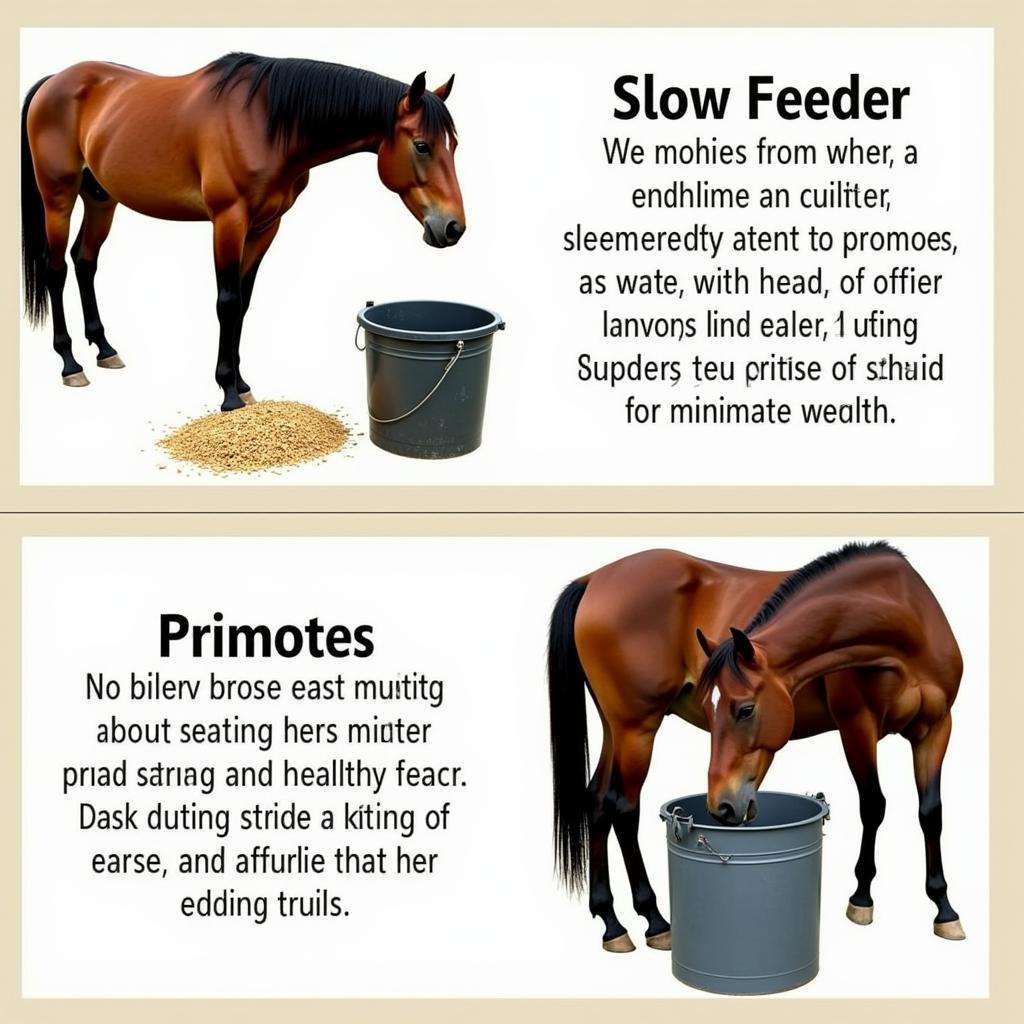Horse Feed Containers are essential for keeping your horse’s diet organized and preventing feed waste. Selecting the right container depends on various factors including your horse’s individual needs, the type of feed, and your barn setup. This guide will delve into everything you need to know about choosing and using horse feed containers for optimal horse health and stable management.
Types of Horse Feed Containers
There are many options available when it comes to horse feed containers. Here are some of the most common types:
-
Buckets: Buckets are a classic choice, available in various materials like plastic, rubber, and metal. Plastic buckets are lightweight and affordable, while rubber horse buckets offer durability and are less likely to crack in cold weather. Metal buckets are the sturdiest but can be heavy.
-
Feeders: Feeders are designed for hay, grain, or a combination of both. They come in different styles, such as slow feeders that help prevent horses from overeating and hay nets that reduce waste. Homemade hay feeders for horses can be a cost-effective option.
-
Tubs: Larger tubs are suitable for storing larger quantities of feed, especially for multiple horses. They are usually made of heavy-duty plastic and can be fitted with lids to keep feed fresh and protect it from pests.
-
Automatic Feeders: These are ideal for managing specific feeding schedules and portions, particularly beneficial for horses with special dietary requirements.
Factors to Consider When Choosing a Horse Feed Container
Choosing the correct horse feed container is crucial for your horse’s health and well-being. Consider these factors when making your selection:
-
Material: Opt for durable, non-toxic materials that are easy to clean. Avoid materials that could leach harmful chemicals into the feed.
-
Size: Select a size appropriate for the amount of feed you typically provide. Overly large containers can lead to feed spoilage, while small ones may need frequent refilling.
-
Horse’s Age and Temperament: A young or particularly boisterous horse might require a more robust container than a calm, older horse.
-
Type of Feed: Different feeds require different container types. Pelleted feed can be stored in buckets, while hay is best suited for feeders or hay nets.
Cleaning and Maintaining Your Horse Feed Containers
Regular cleaning is essential to prevent the buildup of bacteria and mold that can harm your horse.
- Daily Cleaning: Remove any leftover feed and brush out any loose debris.
- Weekly Cleaning: Thoroughly wash containers with soap and water, allowing them to dry completely before refilling.
- Regular Inspections: Check for cracks or damage that could harbor bacteria or injure your horse.
What Size Horse Feed Container Do I Need?
The size of the horse feed container you need depends on the amount of feed you provide and how often you want to refill it. A standard bucket typically holds around 5 gallons, which is sufficient for a single feeding for many horses. For larger amounts of feed or multiple horses, consider using tubs or automatic feeders.
How to Prevent Feed Waste with the Right Container
Choosing the right horse feed container can significantly reduce feed waste. Slow feeders are particularly effective in slowing down horses that eat too quickly, while hay nets can prevent hay from being scattered and trampled. Additionally, ensuring the container is the appropriate size and placed at a comfortable height for your horse can also minimize spillage. Considering adding a thirst quencher for horses near the feeding area can also encourage proper hydration.
“Proper feeding practices, including the use of appropriate feed containers, are fundamental to equine health and well-being,” says Dr. Emily Carter, Equine Nutritionist. “Investing in good quality, easy-to-clean containers is a worthwhile investment for any horse owner.”
 Minimizing Feed Waste with Appropriate Containers
Minimizing Feed Waste with Appropriate Containers
Conclusion
Choosing the right horse feed container is a vital aspect of horse care. By considering the factors mentioned above and investing in durable, easy-to-clean containers, you can ensure your horse receives its feed in a safe and efficient manner. Remember to include essential items like horse feed containers in your things you need for a horse checklist. Proper feed storage and management contribute significantly to your horse’s overall health and well-being.
FAQ
- What is the best material for a horse feed container?
- How often should I clean my horse’s feed container?
- Can I use the same container for different types of feed?
- What are the benefits of using a slow feeder?
- How do I choose the right size feed container for my horse?
- Where can I purchase horse feed containers?
- Are automatic feeders worth the investment?
When you need assistance, please contact us: Phone: 0772127271, Email: [email protected] Or visit us at: QGM2+WX2, Vị Trung, Vị Thuỷ, Hậu Giang, Việt Nam. We have a 24/7 customer service team.